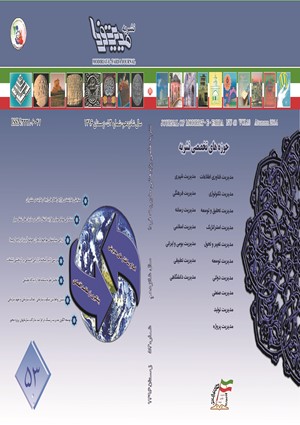شناسایی و طبقهبندی برنامههای عملیاتی مؤثر در تحقق تولید پایدار با استفاده از روش پژوهشی شبکه خزانه و تحلیل مؤلفههای اصلی مطالعه موردی: شرکتهای تولیدی صنعتی استان سمنان
محورهای موضوعی : مدیریت صنعتی
محمد علی شریعت
1
,
سلیمان ایرانزاده
2
![]() ,
علیرضا بافنده زنده
3
,
علیرضا بافنده زنده
3
![]()
1 - دانشگاه ازاد تبریز
2 - دانشگاه آزاد تبریز
3 - دانشگاه ازاد تبریز
کلید واژه: تحلیل مؤلفههای اصلی توليد پايدار شبكه خزانه نظريه سازه شخصي,
چکیده مقاله :
کاهش منابع طبیعی، تغییرات اقلیمی، وخیمتر شدن آلودگی زیستمحیطی، ناسازگاری فعالیتهای عصر صنعتی ازلحاظ اکولوژیکی با محیط و کاهش کیفیت عمر انسانها بهواسطه افزایش صنعتی شدن جهانی، حوزه تولید را تحتفشار شدیدی جهت مقابله با مشکلات و حفظ رقابتپذیری خود قرار داده است. در این راستا موضوع پایداری و بخصوص در حوزه تولید، حرکت در جهت تولید پایدار بهمنظور پاسخگویی به چالشهای پیش روی کشورهای صنعتی در مسیر توسعه پایدار از اهمیت فراوانی برخوردار گشته است. پایداری، یک نیاز مهم و روزافزون برای فعالیتهای بشری است و ایجاد پیشرفت پایدار یک هدف کلیدی در پیشرفت بشری است. پیشرفت پایدار، منظری است که موضوعات اجتماعی، اقتصادی و محیطی را بهطورکلی و همزمان در فرآیند پیشرفت نشانه میگیرد. مفهوم تولید پایدار نیز که ارتباط بسیار نزدیکی با مفهوم توسعه پایدار داشته، شرکتها و سازمانهای تولیدکننده محصولات یا ارائهدهنده خدمات را مورد هدف قرار داده است. این مقاله بر پایداری کسبوکارهای تولیدی تمرکز داشته و سعی دارد تا ضمن شناسایی سازههای تولید پایدار، به ارزیابی و طبقهبندی برنامههای مؤثرتر در این حوزه بپردازد. در این راستا، شناسایی ابعاد و سازههای توليد پايدار با استفاده از ابزار مصاحبه و با تکیهبر فن شبكه خزانه و از ديدگاه مديران 33 شرکت توليدي صنعتي موفق با حداقل فعاليت پيوسته 5 ساله و پایدار در سطح استان سمنان انجام و نسبت به ايجاد 33 شبكه خزانه شخصي منفرد و درمجموع 175 سازه شخصي اوليه توليد پايدار اقدام شد، كه درنهایت با واكاوي و تحليل اين سازهها، شبكه جمعي توليد پايدار مشتمل بر 87 سازه ثانويه ترسيم و سپس در مرحله بعد، با استفاده از روش آماری تجزیهوتحلیل مؤلفههای اصلی PCA سازههای اصلی که نقش مهمتری در تحقق تولید پایدار دارند به دو مؤلفه تقسیم و اجزای آنها، مشخص گردیدند.
The production sector has come under severe pressure to both cope with its problems and maintain competitiveness, by such factors as diminishing natural resources, climate change, worsening environmental pollution, ecological incompatibility of the industrial age activities with the environment, and the decline in quality of human life due to the increasing global industrialization. Meanwhile, sustainability, especially in production, and progress towards sustainable production have grown in importance for developed countries aiming to overcome their challenges for a sustainable development. Sustainability is an increasingly significant need for human activities, and achieving a sustainable development has turned into a major priority for human development. Sustainable development is a landscape that simultaneously targets social, economic, and environmental issues in general within the process of development. Meanwhile, the concept of sustainable production, which is intertwined with the concept of sustainable development, targets manufacturing companies and service providers. This study is focused on sustainability of manufacturing businesses, aiming to both identify sustainable production constructs, and evaluate and classify programs that can play a more effective role in this regard. First, dimensions and constructs of sustainable production were identified through interviews and relying on repertory grid technique, from the viewpoint of 33 managers in successful industrial production companies with at least five consecutive and sustainable years of activity across Semnan Province in Iran. Then 33 personal repertory grids and a total of 175 primary personal constructs were elicited for sustainable production. These constructs were explored and analyzed, and an aggregated grid consisting of 87 secondary constructs was drawn. Next, using principal component analysis (PCA), the principal constructs contributing to sustainable production were categorized into two major concepts and their components were determined
